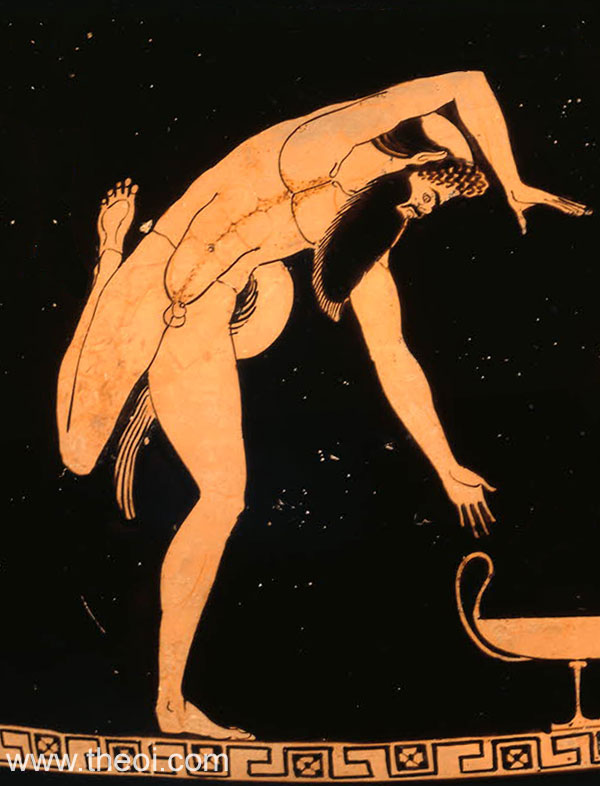HEKATEROS
Greek Name
Ἑκατερος
Transliteration
Hekateros
Latin Spelling
Hecaterus
Translation
Hekateris-Dance

HEKATEROS (Hecaterus) was the demi-god (daimon) of the hekateris--a rustic dance of quickly moving hands--and perhaps also of the skill of hands in general. He was the father of ten children by a daughter of the first man Phoroneus--the five Daktyloi (Dactys) "Fingers" and the five Hekaterides "Moving Hands." His daughters were the mothers of the Kouretes (Curetes), Satyroi (Satyrs) and Oreiades (Oread Nymphs).
FAMILY OF HECATERUS
PARENTS
Perhaps GAIA, thought nowhere stated
OFFSPRING
[1.1] THE HEKATERIDES (by the daughter of Phoroneus) (Hesiod Catalogues Frag 6)
[1.2] THE DAKTYLOI, THE HEKATERIDES (by the daughter of Phoroneus) (Strabo 10.3.19)
[2.1] OAXOS (by Ankhiale) (Servius on Virgil's Eclogues)
CLASSICAL LITERATURE QUOTES
Hesiod, Fragments of Unknown Position Fragment 6 (from Strabo 10.3.19) (trans. Evelyn-White) (Greek epic C8th to 7th B.C.) :
"But of them [the daughters of Hekateros (Hecaterus)] were born the divine Oreias Nymphai (Oread Nymphs) and the tribe of worthless, helpless Satyroi (Satyrs), and the divine Kouretes (Curetes), sportive dancers."
Strabo, Geography 10. 3. 19 (trans. Jones) (Greek geographer C1st B.C. to C1st A.D.) :
"Hesiod says that five daughters were born to Hekateros (Hecaterus) and the daughter of Phoroneus, ‘from whom sprang the mountain-ranging Nymphai (Nymphs), goddesses, and the breed of Satyroi (Satyrs), creatures worthless and unfit for work, and also the Kouretes (Curetes), sportive gods, dancers.’"
Strabo, Geography 10. 3. 22 :
"Sophokles (Sophocles) [tragedian C5th B.C.] thinks that the first male Daktyloi (Dactys) were five in number, who were the first to discover and to work iron, as well as many other things which are useful for the purposes of life, and that their sisters were five in number, and that they were called Daktyloi (Fingers) from their number [ten]." [N.B. The five "sisters" were presumably the Hekaterides.]
COMMENTARY
Hekateros' name is derived from the Greek words hekateris--a dance of swiftly moving hands (kheirôn kinesis)--and hekatereô--a dance involving the kicking of the rump with one heel after the other. Hekateros was also a word meaning "each of two" or "with both hands".
The name could also mean "the marvellous hundred" from the words heka, "hundred", and teras "marvel". This might refer to the hundred skillful fingers (daktyloi) of his five sons and five daughters (i.e. ten children with ten fingers each).
Hekateros was perhaps identified with Seilenos (Silenus), another elderly god of a rustic dance. Both were desribed as grandfathers of the Oreads and Satyrs. Hekateros also appears to be related to the dancing Kourete (Curete) Pyrrhikhos and the kentauros Kheiron (Chiron)--hekateris and kheiron kinesis were two names for the same rustic dance.
SOURCES
GREEK
- Hesiod, Fragments - Greek Epic C8th - 7th B.C.
- Strabo, Geography - Greek Geography C1st B.C. - C1st A.D.
BIBLIOGRAPHY
A complete bibliography of the translations quoted on this page.